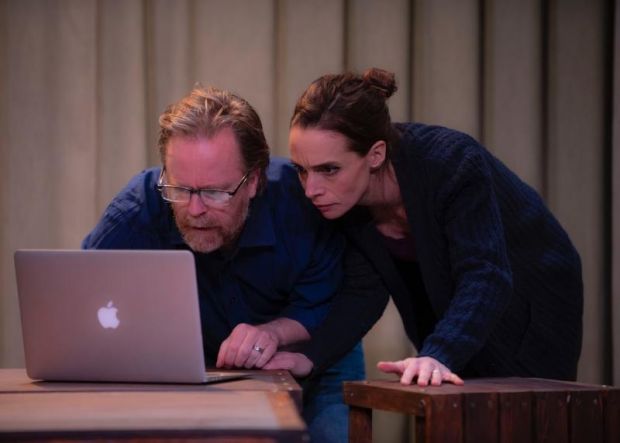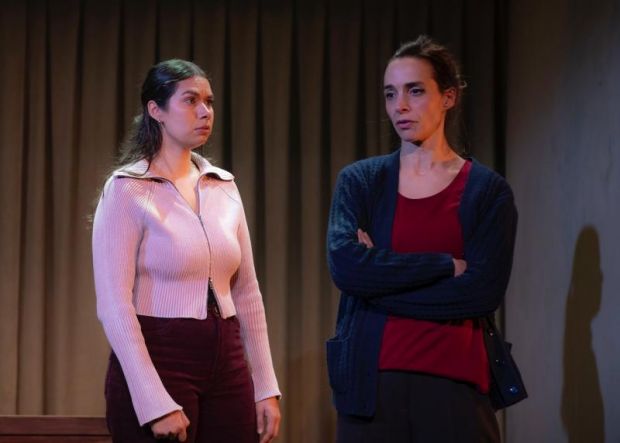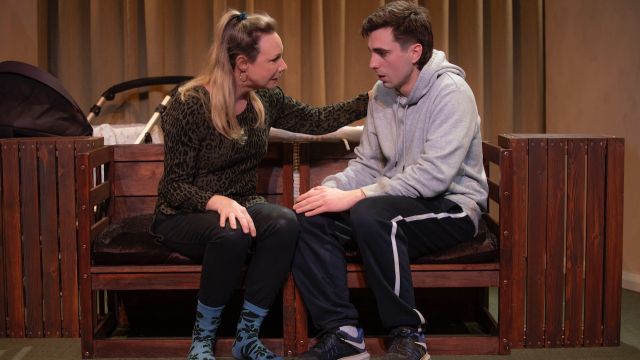Romeo & Julie
Single Dad Romeo (Damon Baudin), eighteen, unemployed, lives with his acerbic alcoholic mother Barb (Belinda McClory) in Splott, a deprived area of Cardiff. He’s the sole carer for his tiny baby, Niamh, whose mother abandoned her and ‘Romy’. No way Barb is helping financially or otherwise; it’s his stupid choice, he can live with it – even though he can scarcely afford nappies. He’s exhausted with feeding, cleaning the baby’s endless poo, and lack of sleep. But Niamh is the centre of Romy’s life; we might even feel that she is all he has… Until he meets Julie (Shontane Farmer) at the local library. He’s only whipped in there, with pram, for a bit of quiet and maybe a quick kip. She wants the whole table to spread out her schoolwork. A budding scientist, totally intent on her A-levels and the hope of getting a place at Cambridge, Julie has her sights fixed on being the next Stephen Hawking. Too bad this ill-starred couple fall in love (or, well, lust). Too bad too for Julie’s parents, stepmother Kath (Claudia Greenstone), an age-care worker, and steelworker Col (Justin Hosking) who have worked and sacrificed so that Julie can realise the dream she’s had all her life…

Although Romeo and Julie live only a couple of streets apart, they’ve never met – and Julie’s family is a cut above Romeo’s – just ask Barb - nicer house, parents employed. Romeo & Julie is very much about class, about obstacles and barriers – like poverty - about opportunities and what can get in the way including the mistakes one makes oneself. (Apart from the cutesy title, any connection to Shakespeare’s tragedy is very tenuous.)
Here is a play that has been very much anticipated on the Red Stitch calendar. It comes trailing four- and five-star reviews for the quality of Gary Owen’s writing, its clear raising of real contemporary issues and for its warmth and humour. And Owen wrote Iphigenia in Splott – an award-winning success for Red Stitch, so much so that they are bringing that play back later this year. We might say that Romeo & Julie doesn’t have the power of Iphigenia – that’s a play that sneaks up on you and punches you in the gut and leaves you outraged – but Romeo & Julie has potentially its own veracity and raw emotions.

So why here does it seem, well, disappointing? Why does it often seem rather flat and repetitious? Part of the answer is perhaps the initial decision to keep Owen’s dialogue as is on the page, but not to ask the cast to reproduce the Welsh accents in which it was written. Curiously, the straight Aussie (not even working class) accents do seem to flatten the Welsh dialogue and its rhythms, somehow rob it of its charm, and its quality of banter and repartee. The wisecracks and smart come backs are there but a little mechanical. Sad as the very real problems and predicaments of the characters are, comedy could lift them, in fact make them more poignant, and take the curse off the play being a very long (first half seventy minutes, second ninety) ‘ain’t it awful’ downhill-all-the-way experience.

Nor should ‘naturalistic drama’ mean a naturalistic set. But here, with a play made up of many short scenes, momentum dies as the cast is tasked with rearranging furniture in dimmed light and even moving walls in closer and ever closer (Barb’s living room), and then wider (Kath and Col’s living room). Sophie Woodward’s design is most effective when the most artificial: the kids (with the baby in her pram) go to a beach, the furniture becomes flotsam, and a dreary seascape is seen only as a framed projection.
And as it’s a ‘naturalistic drama’ – that is, deprived of theatrical artifice – the look of the actors must feel just right, their physicality and personae in sync with their characters. All the British reviews praise the cast, particularly the young leads, for their chemistry, for the way they spark off each other. The characters’ central dilemmas, after all, are brought about by hot, teenage passion. Here, Shontane Farmer and Damon Baudin give it their best, but they just don’t convince as spikey working-class kids from Splott. Indeed, rather than the rough, illiterate-but-quick – albeit with a heart of gold – teen, Baudin, despite going through the changes needed, seems almost like a nice young man from a private school. The respective parents – Greenstone, Hocking and McClory – on the other hand, all seem like real people, and despite some underwriting, they make us feel and understand their bitterness, disappointment and anger.

These curious decisions of direction, design and casting, have the effect of revealing that Romeo & Julie is possibly more suited to being a ninety-minute television play but even then, one that is rather cautious and careful – as if Owen edged more into ‘representative’ rather than real – that is, that its characters are ‘types’. The play’s obvious successes elsewhere would seem to be very much more dependant than usual on cast oomph, directorial decisions, and production ingenuity.
Michael Brindley
Photographer: Jodie Hutchinson
Subscribe to our E-Newsletter, buy our latest print edition or find a Performing Arts book at Book Nook.

